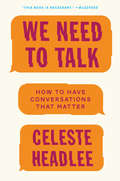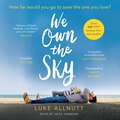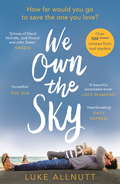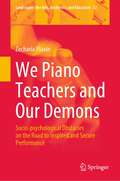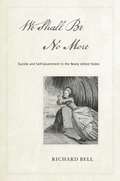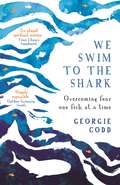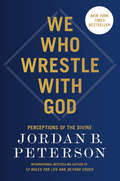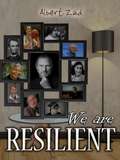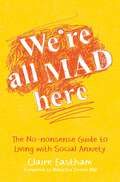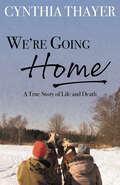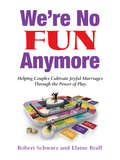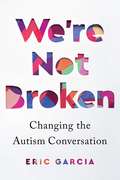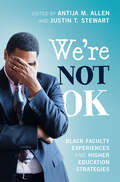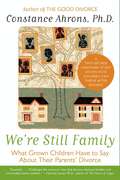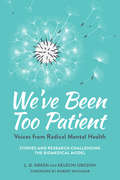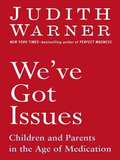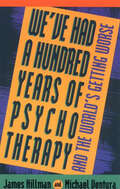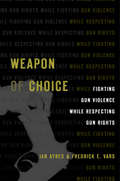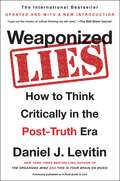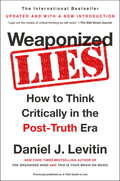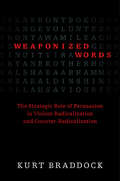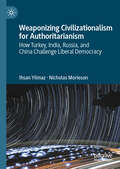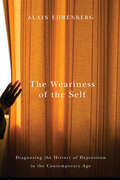- Table View
- List View
We Need to Talk: How to Have Conversations That Matter
by Celeste Headlee“WE NEED TO TALK.”In this urgent and insightful book, public radio journalist Celeste Headlee shows us how to bridge what divides us--by having real conversationsBASED ON THE TED TALK WITH OVER 10 MILLION VIEWS“We Need to Talk is an important read for a conversationally-challenged, disconnected age. Headlee is a talented, honest storyteller, and her advice has helped me become a better spouse, friend, and mother.” (Jessica Lahey, author of New York Times bestseller The Gift of Failure)Today most of us communicate from behind electronic screens, and studies show that Americans feel less connected and more divided than ever before. The blame for some of this disconnect can be attributed to our political landscape, but the erosion of our conversational skills as a society lies with us as individuals. And the only way forward, says Headlee, is to start talking to each other. In We Need to Talk, she outlines the strategies that have made her a better conversationalist—and offers simple tools that can improve anyone’s communication. For example: BE THERE OR GO ELSEWHERE. Human beings are incapable of multitasking, and this is especially true of tasks that involve language. Think you can type up a few emails while on a business call, or hold a conversation with your child while texting your spouse? Think again.CHECK YOUR BIAS. The belief that your intelligence protects you from erroneous assumptions can end up making you more vulnerable to them. We all have blind spots that affect the way we view others. Check your bias before you judge someone else.HIDE YOUR PHONE. Don’t just put down your phone, put it away. New research suggests that the mere presence of a cell phone can negatively impact the quality of a conversation. Whether you’re struggling to communicate with your kid’s teacher at school, an employee at work, or the people you love the most—Headlee offers smart strategies that can help us all have conversations that matter.
We Own The Sky: A heartbreaking page turner that will stay with you forever
by Luke AllnuttA story about love, loss and finding hope-against all odds.Rob Coates can't believe his luck. There is Anna, his incredible wife, and most precious of all, Jack, their son, who makes every day an extraordinary adventure. Rob feels like he's won the lottery of life. Or rather-he did. Until the day it all changes when Anna becomes convinced there is something wrong with Jack.Now Rob sleepwalks through his days, unable to bridge the gulf that separates him from his wife, his son and the business of living. But he's determined to come to terms with what's happened-and find a way back to life, and forgiveness.We Own the Sky will resonate with anyone who has ever suffered loss or experienced great love. Luke Allnutt shows that the journey from hope to despair and back is never as simple as we think, and that even the most thoroughly broken heart can learn to beat again.Read by Jack Hawkins(p) 2018 Orion Publishing Group Ltd
We Own The Sky: An Incredibly Powerful Novel You Won't Be Able to Put Down
by Luke AllnuttHow far would you go to save the one you love?"Anyone who wishes David Nicholls would write faster needs to grab this with both hands." Jill MansellAn emotional page-turner with a heart-pounding dilemma. Fans of Jodi Picoult, David Nicholls and Jojo Moyes will love We Own The Sky.Anna and Rob were the perfect couple with their whole lives in front of them. When beautiful baby boy Jack came along, their world seemed complete.But when tragedy strikes they are faced with an impossible choice. They have one chance to save their child, but at what cost?"...a touching narrative of first love and fatherhood" The Sunday Times****Praise for We Own The Sky'A beautiful, hugely emotional story.' - The Sun'A heartbreaking read about love and loss.' - Bella Magazine'Prepare to have your heart wrenched by this emotion-drenched story.' - Sunday Mirror'This tender depiction of a father's love for his son is utterly heartbreaking and will stay with you long after the book has finished.' - The Express'Deeply affecting. A beautiful, remarkable book.' - Lucy Diamond, author of The Secrets of HappinessUtterly beautiful, heartbreaking and ultimately uplifting. - Rachael Lucas, author of The State of GraceWhat an incredible book this is - such gut-wrenching honesty and depth of emotion. Anyone who wishes David Nicholls would write faster needs to grab this with both hands. It's a truly stunning achievement. - Jill MansellBeautifully rendered and profoundly moving, We Own the Sky illustrates the lengths we'll go to for those we love. Luke Allnutt is a major new talent in fiction and his debut is not to be missed. - Camille Pagán, bestselling author of Life and Other Near-Death Experiences*****What readers are saying about We Own The Sky:'Prepare to weep - I defy anyone to read this and not have a tear in their eye.' reviewer, 5 stars Emotional and moving. - 5* review, AmazonThis is a truly beautiful story told from the heart and written with such great feeling. - 5* review, AmazonI loved this book for its honesty, it's rawness and for its abundance of pure love. It made me laugh, it made me cry, and it will, I know, stay with me for a very long time. - 5* review, Amazon
We Piano Teachers and Our Demons: Socio-psychological Obstacles on the Road to Inspired and Secure Performance (Landscapes: the Arts, Aesthetics, and Education #32)
by Zecharia PlavinThis book focuses on piano teachers and the many pains they encounter in their careers. These pains play an essential role in blocking the musical inspiration of their students. The author identifies with the sensitivities of the teachers, aiming at the inspiration permeated and safer playing of their students.The book penetrates the protective mechanisms of the teachers that, on the one hand, maintain their professional functioning, while on the other hand, block refreshing ideas. It combines exploration of secure and culturally informed inspired playing, coping with exaggerated anxiety and understanding the interaction of piano actions with pianist’s physiology.This book helps to open teachers’ perceptions of the ways to enable more secure and more inspired performances while remembering the inner feelings of the piano teachers.
We Shall Be No More
by Richard BellSuicide is a quintessentially individual act, yet one with unexpectedly broad social implications. Though seen today as a private phenomenon, in the uncertain aftermath of the American Revolution this personal act seemed to many to be a public threat that held no less than the fate of the fledgling Republic in its grip. Salacious novelists and eager newspapermen broadcast images of a young nation rapidly destroying itself. Parents, physicians, ministers, and magistrates debated the meaning of self-destruction and whether it could (or should) be prevented. Jailers and justice officials rushed to thwart condemned prisoners who made halters from bedsheets, while abolitionists used slave suicides as testimony to both the ravages of the peculiar institution and the humanity of its victims. Struggling to create a viable political community out of extraordinary national turmoil, these interest groups invoked self-murder as a means to confront the most consequential questions facing the newly united states: What is the appropriate balance between individual liberty and social order? Who owns the self? And how far should the control of the state (or the church, or a husband, or a master) extend over the individual? With visceral prose and an abundance of evocative primary sources, Richard Bell lays bare the ways in which self-destruction in early America was perceived as a transgressive challenge to embodied authority, a portent of both danger and possibility. His unique study of suicide between the Revolution and Reconstruction uncovers what was at stake-personally and politically-in the nation’s fraught first decades.
We Swim to the Shark: Overcoming fear one fish at a time
by Georgie CoddGeorgie Codd is scared of fish. Really, really scared.Loving the sea and resenting her phobia, she plots to cross continents, learn to dive and swim with the world's biggest fish: the mighty whale shark.Georgie soon plunges into a realm of strange creatures and intrepid diving adventurers. But as her quest to fight fear expands over oceans, the shark remains elusive, and everything else starts to fall apart around her.'We Swim to the Shark is a lesson in not giving up . . . as with all good adventure stories, the real benefit is in the searching' THE I'An almost spiritual mission' TIMES LITERARY SUPPLEMENT 'A terrific read' BBC RADIO NORFOLK 'An enthralling ride' ABC MELBOURNE
We Swim to the Shark: Overcoming fear one fish at a time
by Georgie CoddGeorgie Codd is scared of fish. Really, really scared.Loving the sea and resenting her phobia, she plots to cross continents, learn to dive and swim with the world's biggest fish: the mighty whale shark.Georgie soon plunges into a realm of strange creatures and intrepid diving adventurers. But as her quest to fight fear expands over oceans, the shark remains elusive, and everything else starts to fall apart around her.'We Swim to the Shark is a lesson in not giving up . . . as with all good adventure stories, the real benefit is in the searching' THE I'An almost spiritual mission' TIMES LITERARY SUPPLEMENT 'A terrific read' BBC RADIO NORFOLK 'An enthralling ride' ABC MELBOURNE
We Who Wrestle with God: Perceptions of the Divine
by Jordan B. PetersonA revolutionary new offering from Dr. Jordan B. Peterson, renowned psychologist and author of the global bestseller 12 Rules for Life.In We Who Wrestle with God, Dr. Peterson guides us through the ancient, foundational stories of the Western world. In riveting detail, he analyzes the Biblical accounts of rebellion, sacrifice, suffering, and triumph that stabilize, inspire, and unite us culturally and psychologically. Adam and Eve and the eternal fall of mankind; the resentful and ultimately murderous war of Cain and Abel; the cataclysmic flood of Noah; the spectacular collapse of the Tower of Babel; Abraham&’s terrible adventure; and the epic of Moses and the Israelites. What could such stories possibly mean? What force wrote and assembled them over the long centuries? How did they bring our spirits and the world together, and point us in the same direction? It is time for us to understand such things, scientifically and spiritually; to become conscious of the structure of our souls and our societies; and to see ourselves and others as if for the first time. Join Elijah as he discovers the Voice of God in the dictates of his own conscience and Jonah confronting hell itself in the belly of the whale because he failed to listen and act. Set yourself straight in intent, aim, and purpose as you begin to more deeply understand the structure of your society and your soul. Journey with Dr. Peterson through the greatest stories ever told. Dare to wrestle with God.
We are Resilient
by Albert Zaid Maria Alejandra VicencioIn engineering, material resilience is tis capacity to absorb an impact and to store that energy without deforming. In neuroscience, is the potential to face an adverse situation, overcome it and come out of it empowered. In psychology, it is said it is the capacity some people have to experience traumatic situations and recover from them. Overcoming and recovery together, hand by hand. This book is expositions of the experiences of some of the people consider being real resilient people, and who had been role models and examples of overcoming for millions of people around the World. Such as: Silvia Válori, Stephen Hawking, Abraham Lincoln, Nelson Mandela, Ismael Santos, Ana Frank, Ángel Sanz, Helen Keller, Kyle Maynard, Albert Llovera, The Hoyt Team, Kalpana Saroj, Pablo Pineda, Sean Maloney, Sara Navarro, Steve Jobs, Teresa Silva, Tim Guénard and Carlota Ruiz de Dulanto. It includes an important list of recommended books with their explaining summaries
We're All Mad Here: The No-Nonsense Guide to Living with Social Anxiety
by Claire Eastham Natasha DevonAnxiety is a crafty shapeshifter that can take on many forms: the tiger that sinks its claws in with physical symptoms and distressing thoughts, the cruel and belittling bully creating insecurity and self-doubt and, worst of all, the frenemy rewarding avoidance of social situations with no physical symptoms, no cruel thoughts... and no life beyond your sofa! This no-nonsense guide to beating social anxiety covers everything from surviving university and the workplace, through to social media and making it through parties and dates (whilst actually enjoying them!) With honest insights about her own social anxiety and a healthy dose of humour, award-winning blogger Claire Eastham describes what social anxiety is, why it happens, and how you can lessen its effects with lifestyle choices, talking therapies or even a hug from your favourite canine friend!
We're All Mad Here: The No-Nonsense Guide to Living with Social Anxiety
by Claire EasthamAnxiety is a crafty shapeshifter that can take on many forms: the tiger that sinks its claws in with physical symptoms and distressing thoughts, the cruel and belittling bully creating insecurity and self-doubt and, worst of all, the frenemy rewarding avoidance of social situations with no physical symptoms, no cruel thoughts... and no life beyond your sofa!This no-nonsense guide to beating social anxiety covers everything from surviving university and the workplace, through to social media and making it through parties and dates (whilst actually enjoying them!) With honest insights about her own social anxiety and a healthy dose of humour, award-winning blogger Claire Eastham describes what social anxiety is, why it happens, and how you can lessen its effects with lifestyle choices, talking therapies or even a hug from your favourite canine friend!
We're Going Home: A True Story of Life and Death
by Cynthia ThayerThey were an unlikely pair: a “fast and frantic” woman and a steady, “pickin’ at it” man. And even though both had been raised in cities and knew nothing about farming, Bill and Cynthia Thayer moved to Maine, started an organic farm, and made it work for more than forty years. Then a mysterious disaster strikes and Bill is found lying in the road. In We’re Going Home, Cynthia relates the aftermath of the accident, interspersed with recollections of her life with her beloved “Farmer Bill,” from their first meeting to their final goodbye—and her life beyond.
We're No Fun Anymore: Helping Couples Cultivate Joyful Marriages Through the Power of Play
by Robert Schwarz Elaine BraffIn the 21st century, we tend to expect more than ever from our relationships without knowing how to sustain them. Often a married couple juggling the many demands of life, work and children take their bond for granted. They fail to cultivate and nurture the positive interactions they share, neglecting the fun, playful and sexy side of the relationship. Over time, this neglect creates an increasing spiral of dysfunction. We’re No Fun Anymore reminds therapists and the couples they treat that marriage does not have to mean forfeiting the passion, playfulness and joy in a relationship. With 50 combined years of clinical experience backing it, the program outlined in this book will help to build up a relationship without first tearing it down, examining its weaknesses, or trying to fix its problems. Integrating findings from neuroscience, social psychology, positive psychology and marriage research, We’re No Fun Anymore shows couple therapists how to create and magnify positive energy between their clients to refortify the foundation of their relationship and help it stand strong, even in times of strife and crisis. Readers will find a practical (and fun) plan to get their marriage out of the rut that’s robbing it of fun, recapture the pleasure of dating, romance, and love, and revive the playful quality of sex that makes it the pleasurable and enjoyable experience it’s supposed to be. Clinicians will also get the bonus of increasing the fun that they have in their personal lives and in their clinical work with clients.
We're Not Broken: Changing the Autism Conversation
by Eric Garcia“This book is a message from autistic people to their parents, friends, teachers, coworkers and doctors showing what life is like on the spectrum. It’s also my love letter to autistic people. For too long, we have been forced to navigate a world where all the road signs are written in another language.” <p><p> With a reporter’s eye and an insider’s perspective, Eric Garcia shows what it’s like to be autistic across America. <p><p> Garcia began writing about autism because he was frustrated by the media’s coverage of it; the myths that the disorder is caused by vaccines, the narrow portrayals of autistic people as white men working in Silicon Valley. His own life as an autistic person didn’t look anything like that. He is Latino, a graduate of the University of North Carolina, and works as a journalist covering politics in Washington D.C. Garcia realized he needed to put into writing what so many autistic people have been saying for years; autism is a part of their identity, they don’t need to be fixed. <p><p> In We’re Not Broken, Garcia uses his own life as a springboard to discuss the social and policy gaps that exist in supporting those on the spectrum. From education to healthcare, he explores how autistic people wrestle with systems that were not built with them in mind. At the same time, he shares the experiences of all types of autistic people, from those with higher support needs, to autistic people of color, to those in the LGBTQ community. In doing so, Garcia gives his community a platform to articulate their own needs, rather than having others speak for them, which has been the standard for far too long.
We're Not OK: Black Faculty Experiences and Higher Education Strategies
by Antija M. Allen Justin T. StewartIn the United States, only 6% of the 1.5 million faculty in degree-granting postsecondary institutions is Black. Research shows that, while many institutions tout the idea of diversity recruitment, not much progress has been made to diversify faculty ranks, especially at research-intensive institutions. We're Not Ok shares the experiences of Black faculty to take the reader on a journey, from the obstacles of landing a full-time faculty position through the unique struggles of being a Black educator at a predominantly white institution, along with how these deterrents impact inclusion, retention, and mental health. The book provides practical strategies and recommendations for graduate students, faculty, staff, and administrators, along with changemakers, to make strides in diversity, equity, and inclusion. More than a presentation of statistics and anecdotes, it is the start of a dialogue with the intent of ushering actual change that can benefit Black faculty, their students, and their institutions.
We're Still Family: What Grown Children Have to Say About Their Parents' Divorce
by Constance AhronsWhat is the real legacy of divorce? To answer this question, Constance Ahrons, Ph.D., interviewed one hundred and seventy-three grown children whose divorcing parents she had interviewed twenty years earlier for her landmark study, the basis of which was the highly acclaimed book The Good Divorce. What she has learned is both heartening and significant.Challenging the stereotype that children of divorce are emotionally troubled, drug abusing, academically challenged, and otherwise failing, Dr. Ahrons reveals that most children can and do adapt, and that many even thrive in the face of family change. Although divorce is never easy for any family, she shows that it does not have to destroy children's lives or lead to a family breakdown. With the insight of these grown children and the advice of this gifted family therapist, divorcing parents will find helpful road maps identifying both the benefits and the harms to which postdivorce children are exposed and, ultimately, what they can do to maintain family bonds.
We've Been Too Patient: Voices from Radical Mental Health--Stories and Research Challenging the Biomedical Model
by L. D. Green Kelechi Ubozoh25 unflinching stories and essays from the front lines of the radical mental health movement Overmedication, police brutality, electroconvulsive therapy, involuntary hospitalization, traumas that lead to intense altered states and suicidal thoughts: these are the struggles of those labeled “mentally ill.” While much has been written about the systemic problems of our mental-health care system, this book gives voice to those with personal experience of psychiatric miscare often excluded from the discussion, like people of color and LGBTQ+ communities. It is dedicated to finding working alternatives to the “Mental Health Industrial Complex” and shifting the conversation from mental illness to mental health.
We've Got Issues
by Judith WarnerIn her provocative new book, New York Times-bestselling author Judith Warner explores the storm of debate over whether we are overdiagnosing and overmedicating our children who have "issues. " In Perfect Madness: Motherhood in the Age of Anxiety, Judith Warner explained what's gone wrong with the culture of parenting, and her conclusions sparked a national debate on how women and society view motherhood. Her new book, We've Got Issues: Children and Parents in the Age of Medication, will generate the same kind of controversy, as she tackles a subject that's just as contentious and important: Are parents and physicians too quick to prescribe medication to control our children's behavior? Are we using drugs to excuse inept parents who can't raise their children properly? What Warner discovered from the extensive research and interviewing she did for this book is that passion on both sides of the issue "is ideological and only tangentially about real children," and she cuts through the jargon and hysteria to delve into a topic that for millions of parents involves one of the most important decisions they'll ever make for their child. Insightful, compelling, and deeply moving, We've Got Issuesis for parents, doctors, and teachers-anyone who cares about the welfare of today's children.
We've Had a Hundred Years of Psychotherapy: And the World's Getting Worse
by James Hillman Michael VenturaThe #1 New York Times–bestselling author of The Soul’s Code engages in a wide-ranging dialogue that “bursts with vigorous ideas, tangents, and humor” (Library Journal).This furious, trenchant, and audacious series of interrelated dialogues and letters takes a searing look at not only the legacy of psychotherapy, but also practically every aspect of contemporary living—from sexuality to politics, media, the environment, and life in the city. James Hillman—controversial renegade Jungian psychologist and the man Robert Bly called “the most lively and original psychologist we’ve had in America since William James”—joins with Michael Ventura, cutting-edge columnist for the L.A. Weekly, to shatter many of our current beliefs about our lives, the psyche, and society. Unrestrained, freewheeling, and brilliant, these two intellectual wild men take chances, break rules, and run red lights to strike at the very core of our shibboleths and perceptions.“All sorts of fresh ideas.” —Los Angeles Times“Thought-provoking, fun, and not quite like anything else.” —Library Journal“Range[s] energetically over such subjects as psychotherapy, politics and aesthetics, method acting and postwar ideas of the self, child abuse and inner child theory, romantic love, and America’s tradition of anti-intellectualism . . . Seductive precisely because if offers two live voices actively engaged.” —The Washington Post
Weapon of Choice
by Fredrick E. AyresHow ordinary Americans, frustrated by the legal and political wrangling over the Second Amendment, can fight for reforms that will both respect gun owners’ rights and reduce gun violence.Efforts to reduce gun violence in the United States face formidable political and constitutional barriers. Legislation that would ban or broadly restrict firearms runs afoul of the Supreme Court’s current interpretation of the Second Amendment. And gun rights advocates have joined a politically savvy firearm industry in a powerful coalition that stymies reform.Ian Ayres and Fredrick Vars suggest a new way forward. We can decrease the number of gun deaths, they argue, by empowering individual citizens to choose common-sense gun reforms for themselves. Rather than ask politicians to impose one-size-fits-all rules, we can harness a libertarian approach—one that respects and expands individual freedom and personal choice—to combat the scourge of gun violence.Ayres and Vars identify ten policies that can be immediately adopted at the state level to reduce the number of gun-related deaths without affecting the rights of gun owners. For example, Donna’s Law, a voluntary program whereby individuals can choose to restrict their ability to purchase or possess firearms, can significantly decrease suicide rates. Amending Red Flag statutes, which allow judges to restrict access to guns when an individual has shown evidence of dangerousness, can give police flexible and effective tools to keep people safe. Encouraging the use of unlawful possession petitions can help communities remove guns from more than a million Americans who are legally disqualified from owning them. By embracing these and other new forms of decentralized gun control, the United States can move past partisan gridlock and save lives now.
Weaponized Lies: How to Think Critically in the Post-Truth Era
by Daniel J. LevitinPreviously Published as A Field Guide to Lies We're surrounded by fringe theories, fake news, and pseudo-facts. These lies are getting repeated. New York Times bestselling author Daniel Levitin shows how to disarm these socially devastating inventions and get the American mind back on track. Here are the fundamental lessons in critical thinking that we need to know and share now. Investigating numerical misinformation, Daniel Levitin shows how mishandled statistics and graphs can give a grossly distorted perspective and lead us to terrible decisions. Wordy arguments on the other hand can easily be persuasive as they drift away from the facts in an appealing yet misguided way. The steps we can take to better evaluate news, advertisements, and reports are clearly detailed. Ultimately, Levitin turns to what underlies our ability to determine if something is true or false: the scientific method. He grapples with the limits of what we can and cannot know. Case studies are offered to demonstrate the applications of logical thinking to quite varied settings, spanning courtroom testimony, medical decision making, magic, modern physics, and conspiracy theories. This urgently needed book enables us to avoid the extremes of passive gullibility and cynical rejection. As Levitin attests: Truth matters. A post-truth era is an era of willful irrationality, reversing all the great advances humankind has made. Euphemisms like "fringe theories," "extreme views," "alt truth," and even "fake news" can literally be dangerous. Let's call lies what they are and catch those making them in the act.
Weaponized Lies: How to Think Critically in the Post-Truth Era
by Daniel J. LevitinIt's raining fringe theories, fake news, and pseudo-facts. These lies are getting repeated. New York Times bestselling author Daniel Levitin shows how to disarm these socially devastating inventions and get the American mind back on track. Here are the fundamental lessons in critical thinking (previously published as A Field Guide to Lies) that we need to know and share now. Investigating numerical misinformation, Daniel Levitin shows how mishandled statistics and graphs can give a grossly distorted perspective and lead us to terrible decisions. Wordy arguments on the other hand can easily be persuasive as they drift away from the facts in an appealing yet misguided way. The steps we can take to better evaluate news, advertisements, and reports are clearly detailed. Ultimately, Levitin turns to what underlies our ability to determine if something is true or false: the scientific method. He grapples with the limits of what we can and cannot know. Case studies are offered to demonstrate the applications of logical thinking to quite varied settings, spanning courtroom testimony, medical decision making, magic, modern physics, and conspiracy theories.This urgently needed book enables us to avoid the extremes of passive gullibility and cynical rejection. As Levitin attests: Truth matters. A post-truth era is an era of willful irrationality, reversing all the great advances humankind has made. Euphemisms like "fringe theories," "extreme views," "alt truth," and even "fake news" can literally be dangerous. Let's call lies what they are and catch those making them in the act.
Weaponized Words: The Strategic Role of Persuasion in Violent Radicalization and Counter-Radicalization
by Kurt BraddockStrengthen your understanding of the persuasive mechanisms used by terrorist groups and how they are effective in order to defeat them. Weaponized Words applies existing theories of persuasion to domains unique to this digital era, such as social media, YouTube, websites, and message boards to name but a few. Terrorists deploy a range of communication methods and harness reliable communication theories to create strategic messages that persuade peaceful individuals to join their groups and engage in violence. While explaining how they accomplish this, the book lays out a blueprint for developing counter-messages perfectly designed to conquer such violent extremism and terrorism. Using this basis in persuasion theory, a socio-scientific approach is generated to fight terrorist propaganda and the damage it causes.
Weaponizing Civilizationalism for Authoritarianism: How Turkey, India, Russia, and China Challenge Liberal Democracy
by Ihsan Yilmaz Nicholas MoriesonThis book, based on a systematic analysis of leaders' speeches, examines how regimes in Turkey, India, Russia, and China strategically weaponize the concept of 'civilization' along with emotional appeals, such as pride, fear, and nostalgia, to challenge global liberal democratic norms. As the influence of liberal democracy wanes, these nations increasingly declare themselves &‘civilization-states&’. By redefining national identity to include peoples living in foreign countries, justifying belligerence abroad, and reinforcing anti-democratic practices domestically, these regimes position themselves as guardians of transnational peoples with distinctive civilizational values. This is the first book to systematically explore how and why these states leverage civilization and emotional manipulation to reshape both domestic politics and international relations.
Weariness of the Self: Diagnosing the History of Depression in the Contemporary Age
by Alain EhrenbergDrawing on the accumulated knowledge of a lifetime devoted to the study of the individual in modern democratic society, Ehrenberg shows that the phenomenon of modern depression is not a construction of the pharmaceutical industry but a pathology arising from inadequacy in a social context where success is attributed to, and expected of, the autonomous individual. In so doing, he provides both a novel and convincing description of the illness that clarifies the intertwining relationship between its diagnostic history and changes in social norms and values.
